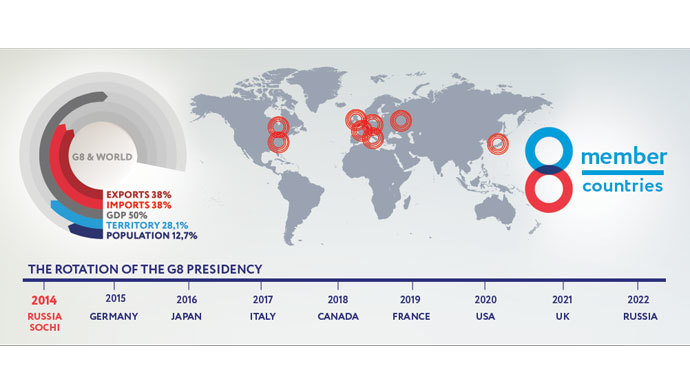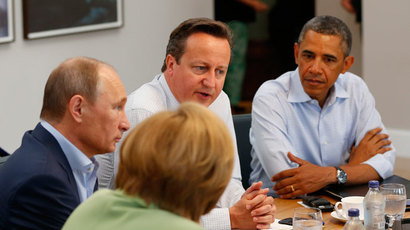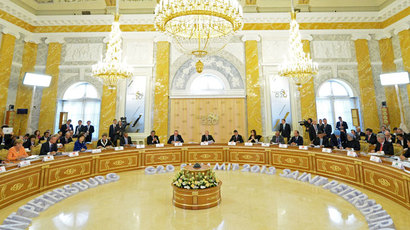Russia assumes G8 presidency, lays out key agenda

On January 1, Russia began its Group of Eight presidency for 2014 and will host the 40th G8 Summit in the Olympic city of Sochi in June. This year’s G8 agenda will focus on fighting terrorism and drug trafficking, managing conflicts and disasters.
Russian President Vladimir Putin has outlined the plan for the
joint work of the group – which includes the US, the UK, Germany,
Italy, France, Britain, Japan, Canada, Russia and representatives
of the European Union – in a statement published on a
newly-launched website for Russia’s G8 presidency.
Russia’s motto for its 2014 G8 presidency is “Risk Management
for Sustainable Growth in a Safe World,” the statement said.
Based on this motto, the priority issues advanced by Russia
include “fighting the drug menace, combating terrorism and
extremism, settling regional conflicts, safeguarding people’s
health, and establishing a global management system to address
risks associated with natural and manmade disasters,” Putin
wrote.
He added that “numerous other issues that have previously
been raised by the G8” have also been included, and some of
them have already been discussed in St. Petersburg in 2006 during
Russia’s first G8 presidency.
The Russian president said that “the world has not become safer in recent years, but it has undoubtedly become more complicated,” saying that while the violent conflicts are growing in numbers, the system of international law is “losing ground.”

In 2013, the meetings of Russia and some of its G8 club partners
have been crucial in avoiding the escalation of the Syrian crisis
at a point when a foreign intervention into the war-torn country
seemed unavoidable. Another international group that includes
Russia, P5+1, worked out a landmark agreement with Iran on its
nuclear program, raising hopes for international trade and
investment opportunities in still heavily-sanctioned country.
G8 countries have also been playing a leading role in the global
economy, producing 50 percent of the world’s GDP and making 38
percent of its exports and imports combined, according to figures
given at the g8russia.ru. Also, according to Interfax, the G8
economies together produce 32 percent of the world’s energy.
According to Putin, Russia does not view the G8 as “an elite
club of world leaders who discuss the destiny of humanity behind
closed doors.” In line with this stance, non-governmental G8
groups – Youth 8, Civil 8, Business 8 and Parliamentary 8 – are
going to provide “crucial support to Russia” during its
G8 presidency.
The idea of transparency and those of “dynamism, innovation
and progress” have been reflected in the constructivist logo
for Russia’s presidency, inspired by the Russian Avant-Garde art
movement of the early 20th century, the official webpage says.
The circles-based logo is also meant to be an allusion to the
fact that the June 4-5 G8 summit will take place in the southern
Russian Black Sea resort city of Sochi, which is hosting the
Winter Olympics in February.
The international forum started as a Group of Six in 1975, saw
Canada and the EU representatives added in 1976 and 1977, and
grew to G8 since Russia’s official joining the Group of Seven in
1997. Although the G7 meetings still take place, with the latest
having been in the UK last May on the level of finance ministers
of the countries, they have focused on pressing economic issues
and are not summoned every year. The G8 meetings are annual and
have included broader range of topics, such as global security,
healthcare and education.














